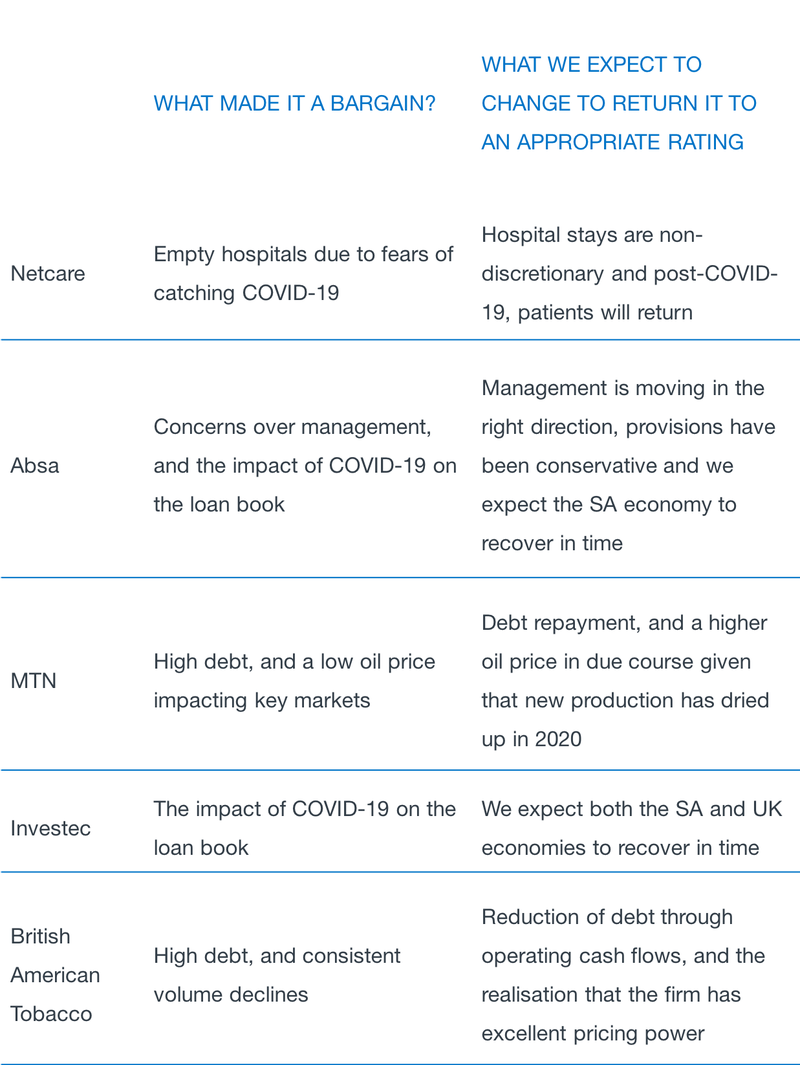Stay abreast of COVID-19 information and developments here
Provided by the South African National Department of Health
CHEAP SHARES: ARE THEY
ALWAYS A BARGAIN?
At Sanlam Private Wealth, our investment philosophy guides us to buy companies at prices below our assessment of their intrinsic value. This means that shares will come onto our radar if they underperform for some time and the price looks attractive. However, a stock is of course only a bargain if it will eventually cease being one. How can we ensure we invest in the ‘value plays’ and avoid getting caught in the ‘value traps’ – companies whose cash-generating power becomes permanently diminished?
While we don’t see ourselves as ‘value’ investors at Sanlam Private Wealth, we do know the future is far from certain, and thus prefer to have a wide margin of safety when buying shares. We typically prefer stocks that are inexpensive relative to our assessment of their fair value. But, of course, it can’t only be about price – we have a definite quality bias in that we always assess whether we would still be proud to own the company 10 years from now.
The key question is whether or not a company has the ability to grow its intrinsic value over time. And more importantly, whether the business can generate returns in excess of its cost of capital. It stands to reason that if a stock remains a bargain in perpetuity, an investor will only see returns from dividends and growth in the underlying earnings. For example, if a stock trades at a cheap-looking 7 times price-earnings (P/E) multiple, grows at 5% per year and pays out half its earnings as dividends, but does not re-rate, then an investor will only make an 11% internal rate of return (IRR), which is below the required return for local equities. For such a company to be a worthwhile investment, its rating would need to increase.
What this means is that before we buy into a ‘cheap’ company that might look like a ‘value play’, we have to ensure that we won’t get caught in what may turn out to be a ‘value trap’ in the long run – in our view, a firm or industry whose cash-generating power has been impacted more or less permanently.
While this may seem obvious, the market is littered with stories of businesses that went into slow decline and never succeeded in clawing their way back up – Kodak is one such example. Over the past decade, such giants as Ford Motor Company and General Electric have delivered negative total returns, and over the past five years, Deutsche Bank and Bed Bath & Beyond have delivered total returns of worse than negative 60%.
An examination of these firms’ earnings history shows they have been in decline for some years. At Sanlam Private Wealth, we believe there is only one way to avoid such potential market pitfalls – by engaging in the deep, fundamental research required to determine not only where a company’s earnings might go, but also where the long-term risks lie. We prefer to invest in companies that have a history of sound financial performance and sustainability, strong cash flow, and strong fundamentals.
On a more practical note, the following will also assist investors in avoiding being caught in a value trap when considering a particular share:
The bottom line is that when considering a company that appears to offer value, it is crucial to understand both what made it a bargain in the first place and what needs to change in order for it to no longer be a bargain. As an example, the table below shows some of this year’s purchases in our clients’ portfolios. While each company was, of course, the subject of thorough fundamental research by our investment team, the table indicates – at a very high level – our views on what made these companies attractive, and what changes are likely to positively impact their long-term earnings.

In line with our investment philosophy, valuation will always be top-of-mind when we at Sanlam Private Wealth build an investment thesis around a particular company or share. This can never be a one-off event, however – our investment team is continually reassessing all our investments to determine not only whether they are valued appropriately, but also whether their business models are sustainable for the long term.
Your wealth plan is designed with you in mind. Your financial reality, aspirations and risk profile.
Carl Schoeman has spent 22 years in Investment Management.

Looking for a customised wealth plan? Leave your details and we’ll be in touch.
South Africa
South Africa Home Sanlam Investments Sanlam Private Wealth Glacier by Sanlam Sanlam BlueStarRest of Africa
Sanlam Namibia Sanlam Mozambique Sanlam Tanzania Sanlam Uganda Sanlam Swaziland Sanlam Kenya Sanlam Zambia Sanlam Private Wealth MauritiusGlobal
Global Investment SolutionsCopyright 2019 | All Rights Reserved by Sanlam Private Wealth | Terms of Use | Privacy Policy | Financial Advisory and Intermediary Services Act (FAIS) | Principles and Practices of Financial Management (PPFM). | Promotion of Access to Information Act (PAIA) | Conflicts of Interest Policy | Privacy Statement
Sanlam Private Wealth (Pty) Ltd, registration number 2000/023234/07, is a licensed Financial Services Provider (FSP 37473), a registered Credit Provider (NCRCP1867) and a member of the Johannesburg Stock Exchange (‘SPW’).
MANDATORY DISCLOSURE
All reasonable steps have been taken to ensure that the information on this website is accurate. The information does not constitute financial advice as contemplated in terms of FAIS. Professional financial advice should always be sought before making an investment decision.
INVESTMENT PORTFOLIOS
Participation in Sanlam Private Wealth Portfolios is a medium to long-term investment. The value of portfolios is subject to fluctuation and past performance is not a guide to future performance. Calculations are based on a lump sum investment with gross income reinvested on the ex-dividend date. The net of fee calculation assumes a 1.15% annual management charge and total trading costs of 1% (both inclusive of VAT) on the actual portfolio turnover. Actual investment performance will differ based on the fees applicable, the actual investment date and the date of reinvestment of income. A schedule of fees and maximum commissions is available upon request.
COLLECTIVE INVESTMENT SCHEMES
The Sanlam Group is a full member of the Association for Savings and Investment SA. Collective investment schemes are generally medium to long-term investments. Past performance is not a guide to future performance, and the value of investments / units / unit trusts may go down as well as up. A schedule of fees and charges and maximum commissions is available on request from the manager, Sanlam Collective Investments (RF) Pty Ltd, a registered and approved manager in collective investment schemes in securities (‘Manager’).
Collective investments are traded at ruling prices and can engage in borrowing and scrip lending. The manager does not provide any guarantee either with respect to the capital or the return of a portfolio. Collective investments are calculated on a net asset value basis, which is the total market value of all assets in a portfolio including any income accruals and less any deductible expenses such as audit fees, brokerage and service fees. Actual investment performance of a portfolio and an investor will differ depending on the initial fees applicable, the actual investment date, date of reinvestment of income and dividend withholding tax. Forward pricing is used.
The performance of portfolios depend on the underlying assets and variable market factors. Performance is based on NAV to NAV calculations with income reinvestments done on the ex-dividend date. Portfolios may invest in other unit trusts which levy their own fees and may result is a higher fee structure for Sanlam Private Wealth’s portfolios.
All portfolio options presented are approved collective investment schemes in terms of Collective Investment Schemes Control Act, No. 45 of 2002. Funds may from time to time invest in foreign countries and may have risks regarding liquidity, the repatriation of funds, political and macroeconomic situations, foreign exchange, tax, settlement, and the availability of information. The manager may close any portfolio to new investors in order to ensure efficient management according to applicable mandates.
The management of portfolios may be outsourced to financial services providers authorised in terms of FAIS.
TREATING CUSTOMERS FAIRLY (TCF)
As a business, Sanlam Private Wealth is committed to the principles of TCF, practicing a specific business philosophy that is based on client-centricity and treating customers fairly. Clients can be confident that TCF is central to what Sanlam Private Wealth does and can be reassured that Sanlam Private Wealth has a holistic wealth management product offering that is tailored to clients’ needs, and service that is of a professional standard.